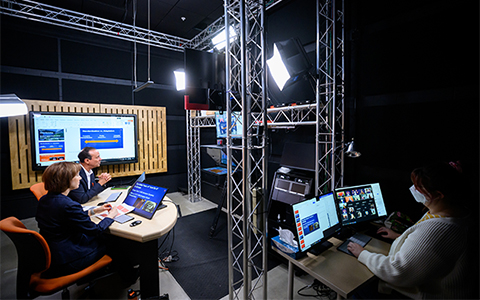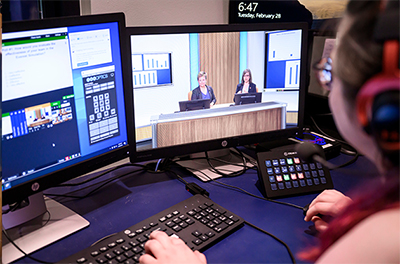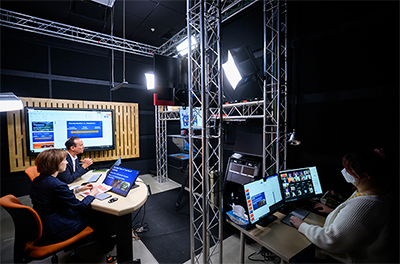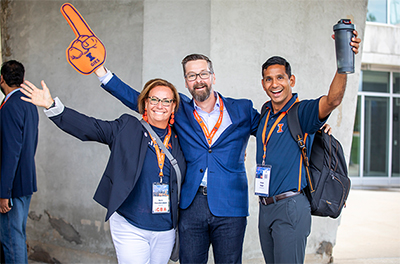Oct 25 Alumni Business Administration Faculty Student
A behind-the-scenes look at the trailblazing Gies iMBA program

Drop into the video production studio on any given day at Gies College of Business at the University of Illinois Urbana-Champaign, and you might think you’ve walked into a bustling network TV studio. Cameras roll as faculty members rotate in and out of one of the high-end content creation studios, delivering the latest lesson for the school’s groundbreaking iMBA or one of the many MOOC courses for the school’s expansive suite of graduate certificate programs and degrees.
Behind the scenes is the school’s large Teaching & Learning unit, a group of experts who support faculty in developing courses for Gies. It started out as a two- person team when Gies introduced its disruptive iMBA back in 2016, and now has over 60 full- and part-time staff working in this area, doing everything from video production to graphic design and learning design, says Tawnya Means, Gies’ assistant dean for educational innovation and former head of the Teaching & Learning unit.
“These are people who are thinking about the design of the program and the course and the specialization to make sure the right types of content are built into the course,” she says. “It then passes to our learning designers who will work with the faculty to identify how they can best deliver the course.
New Building Adds More Studio Space for Gies

That team — the Teaching & Learning unit and specifically the video production staff — will soon be even busier when Gies’ new building, Steven S. Wymer Hall, opens in 2025, with several state-of-the-art studios designed for both synchronous and asynchronous production. The building will include collaboration spaces, traditional and flexible classrooms, academic offices, and the new soundstage production studios.
“With the new building, there will be additional studios and more opportunities for Gies to do innovative types of video production,” Means says. “Some of the staff on our video production team are movie producers on the side, and they’ve got a lot of background and experience with lighting and equipment.
“They’re able to capture the faculty at their best, whether they’re doing a standard lecture video or doing an interview.”
A vast team to develop content
With the growth of staff working in Teaching & Learning, Gies provides cutting-edge videos and high- quality content for the many courses they roll out each year as synchronous and asynchronous courses on Coursera and live in studio.
First, Gies Business needs to make sure that the content they are developing to host on platforms like Coursera is relevant in today’s job market. Gies uses a combination of broad educational market data, combined with Lightcast, or labor market data, to help drive curriculum development for the graduate certificate and degree programs, says Amanda Brantner, Gies’ director of content and educational portfolio strategy.
The Teaching & Learning staff then do everything from building out the courses within the Learning Management System platforms, helping the faculty run the courses’ live sessions smoothly, to using state-of-the-art technology for all aspects course production."
“We highly value the ability to have accessible, flexible, affordable, and high-quality content that students feel engaged in,” Means says. “It lets them have meaningful learning experiences, connect with each other and their peers around the world, and really get a lot of value out of their learning experiences, to the point where many of them report that they’re getting raises or advancing in their careers during the program.”
Professors embrace ability to teach at scale
Denise Lewin Loyd, associate dean of equity, currently teaches Leadership and Teams in Gies’ online MBA program as well as other courses. Loyd says she values the work Means and her team do behind the scenes because it enables her to deliver her online courses in a manner that can feel more intimate than standing and talking to students in a big lecture hall, as she does for some of her other classes.
“In my experience, my teaching in the classroom is primarily about an interaction between myself and the learners. Teaching at scale is made possible by the amazing team that supports not only learners but faculty as well,” Loyd says. “There is tremendous intentionality around how courses are set up, how and when information is communicated, how questions are handled, and so many other factors that allow faculty to teach at scale and learners to get quick and accurate information.”
Using AI creatively in the online classroom

Gies' Teaching & Learning unit is always looking to innovate in the ways they design and support the delivery of their content online, and the unit has recently been using and experimenting with new ways to use artificial intelligence (AI) in the online classroom.
For example, one faculty member is creating a course where he’s designing an activity for learners to train a chatbot, and then the students are assessed on how well they trained the chatbot to answer certain questions. Another example is a generative AI platform the College is using that allows them to build a customized avatar to look and talk like a live professor. The videos are produced using the avatar, and then can easily be edited to update the courses when changes need to be made to the class content.
“This is going to allow us to be a lot more current in the content that we produce, especially in areas like tax law or emerging technologies where things are constantly changing,” Means says.
AI technology is also allowing the College to quickly translate videos in the native language of the student taking the class, a tool that is especially valuable given how many learners around the world are taking Gies’ MOOCs on Coursera.
Academic success team makes sure students stay on course
With so much online content for learners, it is essential that those who are new to the iMBA and other degree programs feel they have enough support from the College so they can confidently navigate an online degree program and understand how to best utilize Gies’ stackability model. The College’s student and academic success team ensures that learners have enough touch points from the day they are admitted to the iMBA or other online degree programs the college offers, says Rachel Seimetz, director of iDegrees for Gies Graduate Programs.

Members of the team have office hours and can answer learners’ questions anytime, and they help students map out their degree plan, including the option to earn additional graduate certificates (Gies’ online students can take advantage of 14 different graduate certificates while in their degree program).
Those who are admitted to a Gies online degree or certificate get a checklist of all the steps they need to complete prior to starting their coursework. Students admitted to the iMBA also have the added benefit of participating in a unique, cohort-style course that they take alongside their first courses in the program to help them get acclimated. That course introduces students to the program’s different requirements, the platforms the College uses, and strategies for fine-tuning their career goals. The onboarding course is cohort-based, which allows students to learn alongside their peers as they begin the program, and they are able to communicate on an online community platform called YellowDig, where they are put into even smaller groups of eight students.
“Within this larger course, they have a smaller space of about eight people who are also just starting and where they can ask questions like, ‘Is anyone else struggling in this course?’ or ‘What classes are you taking next semester?’” says Seimetz. “It’s much easier to do that in this space, and it really allows our students to feel like they’re part of a smaller community.”
There are also touch points throughout the Gies online experience where students get to meet each other in-person, such as Gies’ iConverge event each fall, an optional three-day program where students gather on campus to meet with other students and alumni, participate in breakout sessions on different business topics, and attend a football game together. Students can also come to campus in January and April for two student-led events that are hosted by the student council, where they go to a sporting event, attend speaker panels, and connect with faculty, staff, and alumni.
“Just being at the game and connecting with each other is so great because so many of them have only met in an online capacity,” says Seimetz. “You see them at iConverge, and you would think they’ve been seeing each other every day for years.”

